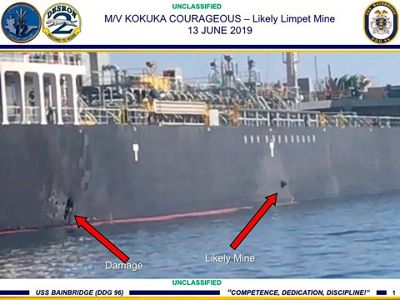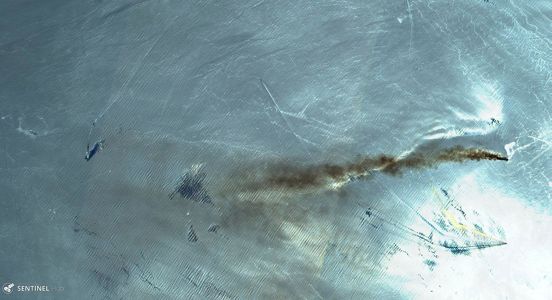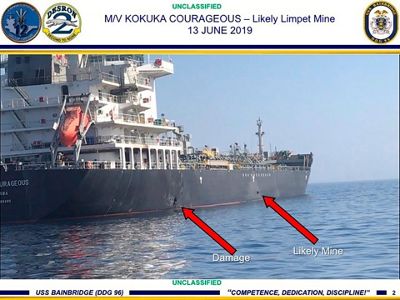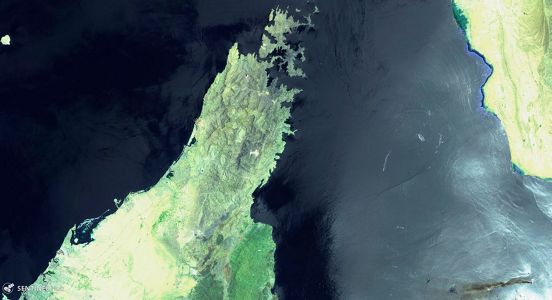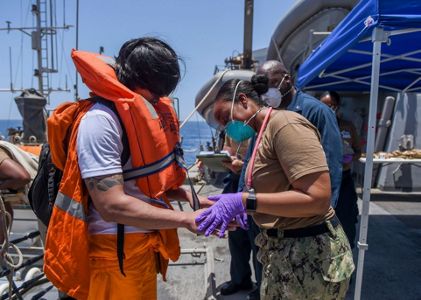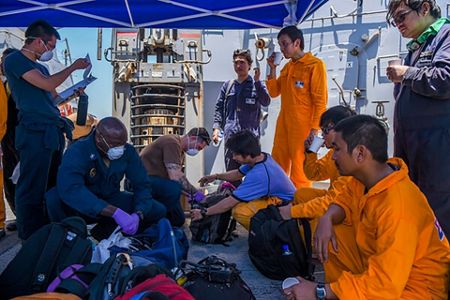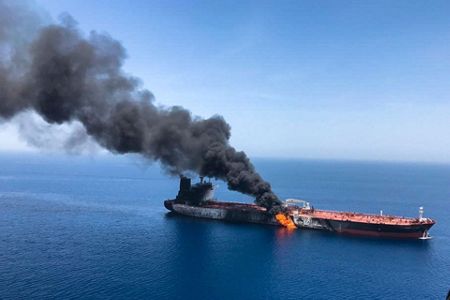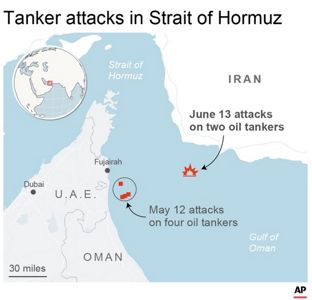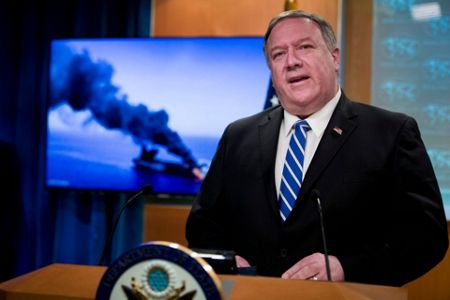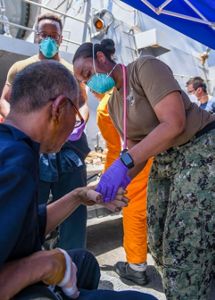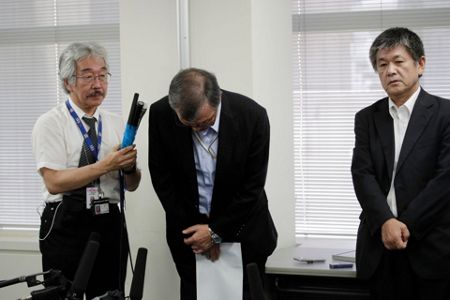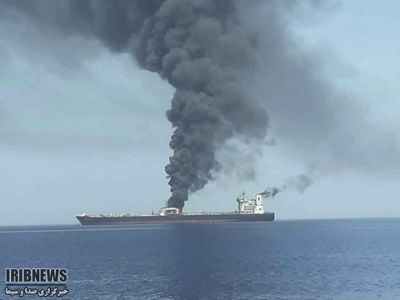DUBAI, United Arab Emirates (AP) — The U.S. military released a video Friday it said showed Iran's Revolutionary Guard removing an unexploded limpet mine from one of the oil tankers targeted near the strategic Strait of Hormuz, suggesting Tehran wanted to hide evidence of its alleged involvement.
Iran denied any role in Thursday's apparent attacks, which have again roiled the Persian Gulf amid heightened tensions between Tehran and Washington over the unraveling nuclear deal with world powers.
Four other oil tankers off the nearby Emirati port city of Fujairah suffered similar attacks in recent weeks, and Iranian-allied rebels from Yemen have struck U.S. ally Saudi Arabia with drones and missiles.
President Donald Trump withdrew America last year from the 2015 nuclear deal that Iran reached with world powers and recently imposed a series of sanctions now squeezing its beleaguered economy and cutting deeply into its oil exports. While Iran maintains it has nothing to do with the recent attacks, its leaders repeatedly have threatened to close the vital Strait of Hormuz, through which 20 percent of the world's oil flows.
Iran accused Washington of waging an "Iranophobic campaign" against it, while Trump countered that the country was "a nation of terror."
"Iran did do it," he said of the attack, in remarks Friday morning to "Fox & Friends."
Trump also warned Iran not to close off the strait, saying if it does so, it won't be shut for long.
The black-and-white U.S. video of the Iranians alongside the Japanese-owned tanker Kokuka Courageous came after its crew abandoned ship after seeing the undetonated explosive on its hull, said Capt. Bill Urban, a spokesman for the U.S. military's Central Command. It separately shared photos of the vessel, which showed what appeared to be a conical limpet mine against its side.
In the video, the boat from Iran's paramilitary Revolutionary Guard pulls alongside Kokuka Courageous at 4:10 p.m. Thursday. The Iranians reach up and grab along where the limpet mine could be seen in the photo. They then sail away.
Limpet mines, which are magnetic and attach to a ship's hull, are designed to disable a vessel without sinking it.
Analysts say Iran, if involved, wouldn't want investigators to find an unexploded mine because they could check its serial numbers and other attributes to trace it.
"The U.S. and the international community stand ready to defend our interests, including the freedom of navigation," Urban said in a statement. "The United States has no interest in engaging in a new conflict in the Middle East. However, we will defend our interests."
In a statement from its U.N. mission, Iran accused the U.S. of escalating tensions.
"The U.S. economic war and terrorism against the Iranian people as well as its massive military presence in the region have been and continue to be the main sources of insecurity and instability in the wider Persian Gulf region and the most significant threat to its peace and security," the statement said.
In Tokyo, the owner of the Kokuka Courageous said its sailors saw "flying objects" before the attack, suggesting it wasn't damaged by mines. Company president Yutaka Katada offered no evidence for his claim, which contradicted the U.S. military account.
Katada also said crew members saw an Iranian naval ship nearby, but did not specify whether this was before or after the attacks.
The suspected attacks occurred at dawn Thursday about 40 kilometers (25 miles) off the southern coast of Iran. The Front Altair, loaded with naphtha from the United Arab Emirates, radioed for help as its cargo of flammable chemicals caught fire. The Kokuka Courageous, carrying methanol from Saudi Arabia and Qatar, called for help a short time later.
The U.S. Navy sent the USS Bainbridge, which picked up 21 sailors from the Kokuka Courageous, and they stayed overnight on the destroyer, returning to their vessel Friday to help in it being towed.
Thursday's attack resembled one in May that targeted four oil tankers off the nearby Emirati port of Fujairah. U.S. officials similarly accused Iran of using limpet mines.
U.S. Secretary of State Mike Pompeo said the U.S. assessment of Iran's involvement was based in part on intelligence, as well as the expertise needed for the operation. It was also based on recent incidents, including the Fujairah attack, he said. He also tied Iran to a drone attack by Yemen's Houthi rebels on a crucial Saudi oil pipeline around the same time.
"Taken as a whole, these unprovoked attacks present a clear threat to international peace and security, a blatant assault on the freedom of navigation and an unacceptable campaign of escalating tension by Iran," Pompeo said. He didn't elaborate.
Iran also denied being involved in last month's attacks. Its foreign minister questioned the timing of Thursday's incidents, given that Japanese Prime Minister Shinzo Abe was meeting Supreme Leader Ayatollah Ali Khamenei in Tehran.
Pompeo noted that Abe had asked Iran to enter into talks with Washington but Tehran "rejected" the overture.
"The supreme leader's government then insulted Japan by attacking a Japanese-owned oil tanker just outside Iranian waters, threatening the lives of the entire crew, creating a maritime emergency," Pompeo added.
On Friday, Abe condemned the attack as a threat to safe navigation.
Abe told reporters he briefed Trump by phone on his trip to Iran but did not give details, except to say the president thanked him for trying to help de-escalate tensions in the region and that he planned to continue cooperating closely with the U.S.
The U.N. Security Council held closed consultations on the tanker incidents late Thursday at the request of the U.S. but took no action.
Tensions have risen as Iran appears poised to break the nuclear deal, which Trump repudiated last year. In the deal, Tehran agreed to limit its enrichment of uranium in exchange for the lifting of crippling sanctions. Now, Iran is threatening to resume enriching uranium closer to weapons-grade levels if European nations don't offer it new terms to the deal by July 7.
Already, Iran says it quadrupled its production of low-enriched uranium. Meanwhile, U.S. sanctions have cut off opportunities for Iran to trade its excess uranium and heavy water abroad, putting Tehran on course to violate terms of the nuclear deal regardless.
Meanwhile, Saudi Arabia said Friday its military intercepted five drones launched by Houthi rebels targeting the kingdom, including the Abha regional airport. The kingdom said a similar attack Wednesday on the airport wounded 26 people.
___
Associated Press writers Edith M. Lederer at the United Nations, Mari Yamaguchi in Tokyo, and Nasser Karimi in Tehran, Iran, contributed.
Copyright 2019 The Associated Press. All rights reserved. This material may not be published, broadcast, rewritten or redistributed.



